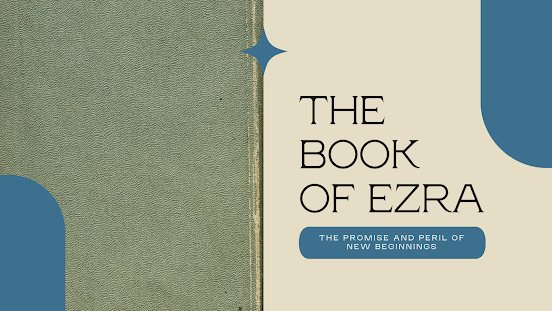Bible Study Blog: The Book of Ezra - The Promise and Peril of New Beginnings (Part 1)
Ezra 1: Cyrus Ends the Exile
1.
Cyrus was no Jew, but his strategy to rule his
empire differed from the Babylonians, whom he had conquered. Instead of
carrying off the idols and gods of conquered peoples, Cyrus chose to placate
them. Not only would this keep the conquered peoples happy, he would also (as
he saw it) gain the favor of their gods.
Ezra 2: The Exiles Return
1.
When Cyrus sends the exiles back to Jerusalem,
they will not find the lands surrounding the city unoccupied. Nebuchadnezzar
left the poorest people to “work the vineyards and the fields” (2 Kings 25:12).
The exiles, on the other hand, included all upper classes, skilled laborers,
and the priestly class. This is going to cause problems when the exiles return
to reclaim their lands. Furthermore, did not God go into exile with his people
in Babylon, as the prophets declare (cf. Ezekiel 11:16, Jeremiah 29:15-16, 28)?
2.
In verses 65-70, we find many prominent families
donating silver, gold, and priestly garments for the reconstruction of the
temple. It can thus be anticipated that these people will expect to have a say
in how the new temple is built and who will be in charge.
Ezra 3: Rebuilding the Altar
1.
Verse 3: The altar is built “despite their fear
of the peoples around them.” The seeds of conflict are already bearing their
ugly fruit.
2.
Verse 7: A new economy takes shape as masons and
carpenters are hired to construct the new temple. Phoenician workers are
brought over from Tye and Sidon who are skilled in construction with the cedar
timbers native to that area. Levites twenty years and older are employed to
supervise the work.
3.
Verse 12: Older priests and family heads who had
seen the former temple complained about the new temple taking shape, for it
paled in its magnificence to the temple Solomon had built which Nebuchadnezzar
destroyed.
Ezra 4: Opposition Grows
1.
Verse 1: The term “enemies of Judah and
Benjamin” is code for Samaritans, or what remained of the ten tribes which
broke off from the Southern Kingdom. As we know from the Old Testament,
Samaritans were hated by Judeans. Not only did they not worship God in
Jerusalem but on Mount Gerizim, they had intermarried with Assyrian peoples who
populated their lands after the Northern Kingdom was conquered. Their ancestral
bloodline was considered to have been corrupted, and thus it was believed were
not true Hebrews.
2.
Verse 2: These peoples were guilty of worshiping
idols in addition to the God of Israel.
3.
Verse 4: Are Zerubbabel, Jeshua, and the heads
of the prominent families being xenophobic and bigoted in their rejection of
the Samaritans?
4.
Verse 5: Why do you think the Samaritans were
determined to thwart construction of the new temple?
5.
Verse 6: The Samaritans dispatch a letter of
complaint to King Artaxerxes, who orders an immediate halt to the rebuilding of
Jerusalem and its temple. This is evidence that the rift between Samaritans and
Judeans is fully aflame.
Ezra 5: Reconstruction Resumes
1.
Zerubbabel, with the blessing of the prophet
Haggai, resumes reconstruction of the temple. Tattenai, the governor, confronts
them and dispatches a letter to King Darius, who affirms Cyrus’s edict and
further decrees that no official is to interfere with the work on this temple
of God. Furthermore, the expenses for the reconstruction are to be paid from
the royal treasury and all that is necessary for religious sacrifices are to be
provided.
2.
Verse 14: Reconstruction is completed on
September 21, 520 B.C.E., about 3½ years after it began.
3.
Verse 21: The Passover is celebrated with those
who had renounced the gods of their Gentile neighbors. This likely included
Samaritans. This inclusion will not last.
For further discussion:
1.
The prophets are silent on the inclusion or
exclusion of Samaritans and other peoples from the reconstruction of the temple
and the celebration of the Passover. We know where Ezra stands. Do you think
this is a prophetic accident, leaving it up to the reader to decide on what
should have been done? Or, are we being challenged to think about what we would
do in a similar situation?
2.
In Ezra and Nehemiah, we find numerous examples
of humanity’s tendency to use purity standards to benefit and/or exclude specific groups of
people. Is it fair to say that the leaders are bigoted, or are they scared of
foreign peoples corrupting their faithfulness to God?



Comments
Post a Comment